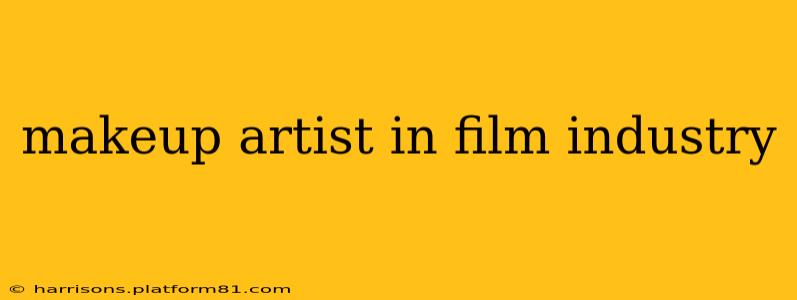The film industry is a world of glamour and illusion, and behind the captivating performances lies the artistry of the makeup artist. These skilled professionals are much more than just beauticians; they're storytellers, illusionists, and crucial collaborators who bring characters to life. This in-depth guide delves into the multifaceted world of a film makeup artist, exploring the roles, responsibilities, and skills required for success in this dynamic field.
What Does a Makeup Artist Do in the Film Industry?
A film makeup artist's role extends far beyond applying lipstick and foundation. They are responsible for creating a wide range of looks, from natural and enhancing to incredibly transformative, depending on the character and the director's vision. This might involve:
- Character Design: Collaborating with the director, costume designer, and other members of the creative team to design the makeup for each character, ensuring it aligns with the overall aesthetic and narrative.
- Prosthetic Application: Applying prosthetics, such as scars, wounds, aging effects, and creature features, using specialized techniques and materials.
- Special Effects Makeup: Creating realistic-looking special effects, including injuries, blood, and other visual effects, often in conjunction with special effects teams.
- Hair Styling (Sometimes): Many film makeup artists also handle hair styling, offering a complete look for the actors.
- Maintaining Continuity: Ensuring the actor's makeup remains consistent throughout the shoot, making necessary touch-ups and adjustments between scenes.
- Working with Diverse Skin Tones and Types: A crucial aspect involves understanding and working with diverse skin tones and types, ensuring accurate color matching and application techniques.
What Skills Do You Need to Be a Film Makeup Artist?
Success in this field demands a blend of artistic talent, technical proficiency, and interpersonal skills. Key skills include:
- Artistic Ability: A strong understanding of color theory, facial anatomy, and the ability to create believable and compelling looks.
- Technical Proficiency: Expertise in various makeup techniques, including airbrushing, prosthetic application, special effects makeup, and hair styling.
- Product Knowledge: In-depth knowledge of various makeup products, their properties, and application techniques.
- Problem-Solving Skills: The ability to think creatively and find solutions to unexpected challenges on set.
- Collaboration Skills: The capacity to work effectively with actors, directors, and other members of the film crew.
- Patience and Precision: Meticulous attention to detail is crucial for creating realistic and flawless looks.
How Do I Become a Film Makeup Artist?
There's no single path to becoming a successful film makeup artist, but a common trajectory involves:
- Formal Education: Cosmetology school or a specialized makeup program can provide a strong foundation in makeup techniques and artistry.
- Building a Portfolio: Creating a diverse portfolio showcasing various makeup styles and techniques is crucial for attracting potential employers. This often involves volunteer work, independent projects, and short films.
- Networking: Building connections within the film industry through networking events, industry contacts, and online platforms.
- Gaining Experience: Starting with smaller productions and gradually working your way up to larger projects allows you to gain valuable experience and build your reputation.
What is the Difference Between a Makeup Artist and a Special Effects Makeup Artist?
While both are crucial to the visual storytelling of film, their focus differs. A makeup artist typically focuses on enhancing the actor's features, creating character looks, and ensuring continuity. A special effects makeup artist, on the other hand, specializes in creating realistic wounds, prosthetics, and other visual effects that require advanced techniques and materials. Often, a film production will employ both.
How Much Do Film Makeup Artists Make?
Salaries for film makeup artists vary significantly depending on experience, location, and the size of the production. Beginners might earn less, while highly experienced and sought-after artists can command substantial salaries.
What are the Challenges of Being a Film Makeup Artist?
The job can be demanding, requiring long hours, often under pressure and in challenging environments. Other challenges include:
- Tight Deadlines: The fast-paced nature of film production requires artists to work efficiently and meet tight deadlines.
- Physical Demands: The work can be physically demanding, requiring long hours of standing and working in close proximity to actors.
- Maintaining Consistency: Ensuring the makeup remains consistent throughout the shoot requires careful attention to detail and meticulous touch-ups.
The world of film makeup artistry is a blend of creativity, technical skill, and collaboration. For those with a passion for makeup and the film industry, it offers a rewarding and dynamic career path.
